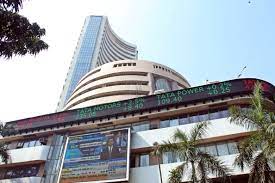There are many stock exchanges in India, but only two main ones on which most of the stock trading occurs –
BSE (previously Bombay Stock Exchange) – oldest stock exchange in Asia, dating back to the 1850s, now a listed company
National Stock Exchange – NSE was established in 1992 to provide a modern, fully automated screen-based electronic trading system that offered easy trading facilities to investors spread across the length and breadth of the country.
About
BSE
Asia’s first stock exchange, BSE continues to bring trust and stability to capital market in India. It has over 40,000 trading terminals connected through 2918 Lease Lines and 1841 VSAT terminals which are spread over 400 cities. BSE has a proven trading and settlement platform assuring efficient on-time transactions and is a Self-Regulatory Organization (SRO) ensuring transparency to all stakeholders. It has ISO certified processes governing clearing and settlement, Information Technology and Surveillance and offers seamless settlement processes supported by state-of-the-art clearing and system.
The history of BSE can be traced back to 1850s when a group of five stock brokers used to conduct meetings under the banyan tree in front of Mumbai Town Hall. As the number of the brokers increased, they started changing the venue of the meeting constantly. Almost two decades later, this small group moved to the Dalal Street in 1874, and later, in the following year, it was recognized as an official organization by the name ‘The Native Share & Stock Brokers Association’. As per the Securities Contracts Regulation Act, BSE became the first stock exchange to be recognized by the Government of India in 1956.
BSE Sensex was developed in 1986 which was considered a tool to measure the overall performance of the Bombay Stock Exchange. Using this index, various equity derivative markets were open and many future trading contracts were made in 2000 which further led to expansion of its trading platform.
BSE switched to electronic trading system in 1995. ‘BOLT’ or the ‘BSE On Line Trading’ is the automated version of the trading platform, which is screen based and currently has a capacity of 8 million orders per day. Also, BSE is the first stock exchange in the world to introduce centralized internet trading system (BSEWEBx.co.in), allowing investors from all over the world to trade on the BSE platform.
BSE is one of India’s leading exchange groups. Over the past 145 years, BSE has provided a capital-raising platform and provided a platform for trading in equity, debt instruments, derivatives and mutual funds. It also has a platform for trading in equities of small-and-medium enterprises (SME).
BSE has a number of subsidiaries and initiatives –
- BSE Institute (BIL) is the learning solutions arm and a wholly owned subsidiary of the BSE Limited. BIL conducts a wide range of programs ranging from 1-Day workshops to 2-years full time post graduate programs in financial markets. BIL train over 20,000 participants a year.
BIL also conducts certification exams for financial market professionals to enable them to practice their profession in various areas like cash markets, derivatives, and mutual funds. Every year it certifies over 40,000 market professionals. With the launch of part time post-graduation programs in Data Analytics, Financial Technology & Cyber Security, BIL strives to bolster the financial & technical / IT eco-system by imparting requisite knowledge about newer technologies & applications to deserving candidates. - BSE Star Mutual Fund offers Mutual Fund Distributors (MFD) and IFAs to purchase and redeem mutual fund units on behalf of their clients. Although the platform allows both physical and demat forms of holding for MF investments, it is more amenable and easier to hold units in dematerialised form by opening a demat account. This reduces considerably the hassle and tedium of filling out application forms, giving cheques, depositing them at nearby collection centres, getting statements of account (SOA) after few days, etc. Hence investor can get demat units on the next working day following their date of application as well as redemption proceeds as per the respective TATs followed by the RTAs for each scheme. Existing investors can invest through the same channel (brokers) that they use to purchase stocks. Investors have the added convenience of viewing their mutual fund investments all in one place along with the other investments in a single demat account.
- BSE Technologies (MT) is an established player in e-enabling the businesses in financial services sectors. MT is a leading provider of cutting edge IT solutions with focus on Commodities, Banking and Financial Services markets in India. MT has a strong team of over 300+ professionals for development and support who are well versed in stock, derivative & commodities market exchanges and broking operations. Market Place is one of the leading providers of software solutions for the brokers in the Indian Capital, Derivatives, Commodities and Currency Markets.
- BSE Administration & Supervision Ltd. (BASL) has been incorporated as a wholly owned subsidiary of BSE Ltd. for carrying out the administration and supervision activities of all SEBI registered Investment Advisers. SEBI has granted the recognition to BASL to carry out the administration and supervision of RIAs w.e.f. June 01, 2021. Based on recognition provided to BASL all existing SEBI registered IAs and new applicants desirous of obtaining registration as Investment Advisor are required to register with BASL as a member. The administration and supervision of BASL members will be in accordance with SEBI Regulations and circulars, and bye-laws and circulars / guidelines issued by BASL from time to time.
- CDSL, a leading securities depository, is promoted by BSE Ltd. and by leading private and public sector banks. CDSL’s enduring focus on delivering quality services and innovative products has propelled it on a high-growth path in recent years. Since the financial services industry has become increasingly IT-reliant, cutting-edge technology is at the heart of CDSL’s strategic vision. Above all, it is the ethos built by CDSL’s management – of user responsiveness and ability to speedily address new developments. Presently, CDSL’s services are delivered by 583 Depository Participants to more than 1.09 crore depository accountholders from over 16,000 locations across India.
- Indian Clearing Corporation Limited (“ICCL”) was incorporated in April 2007 as a wholly owned subsidiary of BSE. ICCL clears and settles trades executed on all the segments of BSE, including Equity Cash, BSE SME, Offer for Sale, Securities Lending & Borrowing, Equity Derivatives, Debt Segment, Sovereign Gold Bonds, Interest Rate Futures and the Currency Derivatives Segment. It also settles trades reported on the Indian Corporate Debt Segment and the Mutual Fund segment of BSE. Recently, ICCL received recognition as a Third Country Central Counterparty (“TC-CCP”) by European Securities and Market Authority (ESMA) in accordance with the European Market Infrastructure Regulation (EMIR). A TC-CCP recognized under the EMIR process also receives the Qualified Central Counterparty (“QCCP”) status across the European Union, and so is subject to lower capital requirements/charges under the Basel III Framework introduced by the Basel Committee on Banking Supervision. ICCL operates under the primary regulation of the SEBI and also the Reserve Bank OF India (“RBI”)
- India Inx is a wholly-owned subsidiary of BSE Ltd, commenced its trading activities on January 16, 2017 and is India’s first International Exchange set up at GIFT City. It is one of the world’s most advanced technology platforms with a turn-around time of 4 micro seconds and operates for 22 hours a day to allow international investors and Non Residents Indians to trade from anywhere across the globe. The exchange provides a common platform for all asset classes – equities, currencies, commodities. The exchange proposes to commence offerings of depository receipts and bonds once the required infrastructure is in place. India INX offers a diversified portfolio of products and technology services at a cost which is far more competitive to Indian exchanges as well as other global exchanges like those in Hong Kong Singapore, Dubai, London and New York. The exchange being located in IFSC, GIFT City, provides competitive advantage in terms of tax structure and supportive regulatory framework. These include benefits in security transaction tax, commodity transaction tax, dividend distribution tax and long-term capital gain tax waivers and no income tax.
- India International Clearing Corporation (IFSC) Limited (India ICC), a CARE AAA rated clearing corporation, is a Securities and Exchange Board of India (SEBI) recognised Central Counter Party, providing clearing & settlement and risk management services. It is a wholly owned subsidiary of the BSE and is located at the IFSC, GIFT City. India ICC commenced operations from January 16, 2017. It provides clearing & settlement, risk management and collateral management services to the India International Exchange (IFSC) Limited (India INX), a wholly owned subsidiary of the BSE operating at the IFSC, Gift City.
NSE
National Stock Exchange of India Limited (NSE) is the leading stock exchange of India, located in the Mumbai (Bombay) city of Maharashtra state. It is owned by leading financial institutions including Life Insurance Corporation, State Bank of India, IFCI Limited, IDFC Limited and Stock Holding Corporation of India Limited. Key global investors include Gagil FDI Limited, GS Strategic Investments Limited, SAIF II SE Investments Mauritius Limited, Aranda Investments (Mauritius) Pte Limited, and PI Opportunities Fund I.
The exchange was incorporated in 1992 as a tax-paying company and was recognized as a stock exchange in 1993 under the Securities Contracts (Regulation) Act, 1956, when P. V. Narasimha Rao was the Prime Minister of India and Manmohan Singh was the Finance Minister. NSE commenced operations in the Wholesale Debt Market (WDM) segment in June 1994. The capital market (equities) segment of the NSE commenced operations in November 1994, while operations in the derivatives segment commenced in June 2000. NSE offers trading, clearing and settlement services in equity, equity derivative, debt, commodity derivatives, and currency derivatives segments. It was the first exchange in India to introduce an electronic trading facility thus connecting the investor base of the entire country. NSE has 2500 VSATs and 3000 leased lines spread over more than 2000 cities across India.
NSE Academy Limited, a subsidiary of NSE Investments Limited (formerly known as NSE Strategic Investment Corporation Limited) was setup in March 12, 2016 to promote financial literacy as a necessary life skill and provide training and certifications in Banking, Insurance and Financial Markets. It promotes development of a pool of human resources having right skills and expertise in each segment of the BFSI industry to provide quality intermediation to market participants.
Subsidiaries include –
- NSE Clearing Limited (formerly known as National Securities Clearing Corporation Limited), NSE Clearing, a wholly owned subsidiary of NSE is responsible for clearing and settlement of all trades executed on NSE and deposit and collateral management and risk management functions. NSE Clearing was the first clearing corporation to be established in India and we introduced settlement guarantee before it became a regulatory requirement.
- NSE Data and Analytics – The data and info-vending products of NSE are provided through this subsidiary set-up dedicated solely for this purpose. Products include On-line streaming data feed (Level 1,Level 2,Level 3 and tick by tick data), Snapshot data feed, End of day data, Historical data, Corporate Data, NSE Fixed Income Valuations.
- NSE Foundation is a Section 8 company that undertakes the CSR activities of the National Stock Exchange of India Limited and its subsidiaries (NSE Group), with a broad vision to enhance the well-being of underprivileged and marginalised communities. NSE Foundation implements its activities in seven core focus area with emphasis on three key areas – Primary Education, Elder Care and Sanitation and Safe Drinking Water. NSE Foundation has supported more than 75 projects in seven sectors across 10 Indian states, impacting more than eight lakh (800,000) beneficiaries.
- NSE Indices Limited (formerly known as India Index Services & Products Limited), or NSE Indices, owns and manages a portfolio of 67 indices under the NIFTY brand as of September 30, 2016, including NIFTY 50. NIFTY indices are used as benchmarks for products traded on NSE. NIFTY indices served as the benchmark index for 38 ETFs listed in India and 12 ETFs listed abroad as of September 30, 2016. Derivatives benchmarked to NIFTY indices were also available for trading on four international stock exchanges as of November 30, 2016, pursuant to cross-listing arrangements and license agreements with the Singapore Exchange, the Chicago Mercantile Exchange, the Taiwan Futures Exchange and the Osaka Securities Exchange
- NSE Investments Limited (NSE Investments), a wholly owned subsidiary of NSE, was incorporated to, inter alia, make/hold strategic investments in the equity shares and/or other securities of NSE group companies. NSE Investments is the primary CIC arm of NSE to explore investment opportunities in Technology, Indices, Education, Private Marketplaces & Exchanges, Payments, Database Services, Trading Platform, Exchange, Machine Learning, among others. We look for potential opportunities which can be either complementary to the business of or provide growth opportunity in new business areas to one or more the NSE Group entities in related or incidental areas. NSE investments work closely with the investing companies with the overall objective of embracing new technology platforms and product areas which have or can have greater application in the capital market eco-system. NSE Investments has investments in companies ranging from interest in Database, Indices, Technology, Education, Exchange, among others. Our investment philosophy is to make strategic investments in the company and to be an equal partner in the growth of such entity in such a way that can add value to the NSE Group.
- NSE International Exchange Limited (NSE IFSC) is a fully owned subsidiary company of National Stock Exchange of India Limited (NSE) and applied to the SEBI for in-principle approval to establish an international exchange in Gujarat International Finance Tech City – International Financial Service Centre. NSE IFSC Limited would also be permitted to offer longer trading days than what stock exchanges are currently permitted to do in India.
- NSE IFSC Clearing Corporation Limited (NICCL) is a fully owned subsidiary of NSE Clearing Limited (formerly known as National Securities Clearing Corporation Limited) (NSE Clearing). NICCL currently acts as a clearing corporation for all the trades executed on NSE IFSC Ltd. NICCL provides counter-party guarantee for the trades executed on NSE IFSC Ltd. to ensure efficient clearing and settlement for trades. NICCL has established and maintain Settlement Guarantee Fund (SGF) based on the norms defined by SEBI.
- NSEIT Limited is a global technology enterprise, focused on delivering excellence in complex digital environment primarily in banking, insurance, capital market ecosystem and online examinations.
- NSE Infotech was incorporated to cater to the needs of NSE and all its group companies, exclusively. NSE has regularly upgraded its information technology systems and infrastructure, with the over-arching goal of achieving higher capacity and lower latency, improving market efficiency and transparency, enhancing user access and providing flexibility for future business growth and market needs. The various application systems that NSE uses for its trading as well clearing and settlement and other operations form the backbone of the Exchange framework.
Associate/ Affiliate Companies
- National Securities Depository Ltd. – NSDL is a depository for securities listed on Indian exchanges that are held and settled in dematerialized form. The enactment of Depositories Act in August 1996 paved the way for establishment of NSDL, the first depository in India. NSE joined hands with the Industrial Development Bank of India (IDBI) and the Unit Trust of India (UTI) to set up NSDL, the first depository in India.
- National Commodity and Derivative Exchange Ltd. – NCDEX is a professionally-managed online commodity exchange, set up through collaboration with the Life Insurance Corporation of India, the National Bank for Agriculture and Rural Development and ten other Indian and foreign partners.
NCDEX offers trading in agricultural commodities, bullion commodities and metals. - Power Exchange India Ltd. Power Exchange India Limited (PXIL) is India’s first institutionally promoted Power Exchange which began operations in 2008. PXIL provides an electronic trading platform for India-focused electricity futures. Participants in PXIL include electricity traders, inter-state generating stations, power distribution licensees and independent power producers.
Media
Bombay Stock Exchange ready with technology for launching electronic gold receipts, October 2021
BSE is ready with its technology to introduce electronic gold receipts (EGRs) on its platform, which will help in creating a uniform price structure of the yellow metal across the country. The exchange will take the required internal approvals and apply to market regulator Sebi for the launch of the new class of security on its platform. The instruments representing gold will be called Electronic Gold Receipts (EGRs) and it will be notified as securities. EGRs will have trading, clearing and settlement features akin to other securities that are currently available in India.
Like shares, these EGRs will be held in demat form and can be converted into physical gold when needed. To enable trading in physical gold, EGRs (backed by physical gold) will be traded and settled on stock exchanges.The entire trading will be done in three tranches that include conversion from physical gold to EGRs, trading of EGRs and again conversion of EGR back to physical gold.
Comparison with leading stock exchanges – NYSE, London, Singapore etc




You must be logged in to post a comment.